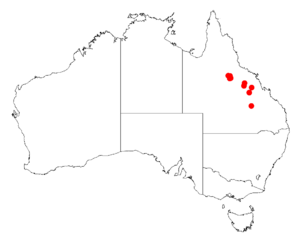Acacia faucium facts for kids
Quick facts for kids Acacia faucium |
|
|---|---|
| Scientific classification | |
| Genus: |
Acacia
|
| Species: |
faucium
|
 |
|
| Occurrence data from AVH | |
Acacia faucium is a type of tree that belongs to the large Acacia family. It is found naturally only in the northeastern parts of Australia.
What is Acacia faucium Like?
This tree usually grows up to 10 m (33 ft) (about 33 feet) tall. Its young branches are somewhat rough and have tiny hairs.
Like many Acacia trees, it doesn't have regular leaves. Instead, it has special flattened stems called phyllodes. These phyllodes are straight or slightly curved like a sickle. They are widest in the middle, measuring about 13 to 18 cm (5.1 to 7.1 in) long and 20 to 27 mm (0.79 to 1.06 in) wide. They feel smooth or have a few hairs when young.
Its Flowers and Seeds
The flowers of Acacia faucium grow in simple, cylinder-shaped spikes. These spikes are 35 to 55 mm (1.4 to 2.2 in) long and are full of bright yellow flowers.
After the flowers bloom, brown-black seed pods start to form. These pods are a bit stiff and straight, about 8 cm (3.1 in) long and 3 mm (0.12 in) wide. They are smooth and often have a white, powdery coating. Inside, the seeds are arranged lengthwise.
The seeds themselves are pale brown, about 3.5 to 4 mm (0.14 to 0.16 in) long and 2 mm (0.079 in) wide. Each seed has a yellow, folded attachment called a funicle.
Where Does Acacia faucium Grow?
Acacia faucium is found only in the eastern-central parts of Queensland, Australia. This means it is endemic to that area. It grows in separate, unconnected spots, which is called a disjunct distribution.
You can find it as far north as the streams that feed into Torrens Creek in the White Mountains National Park. Here, it often grows in rocky sandstone gorges. It also grows further south, about 100 km (62 mi) north of Clermont, in areas with broken or uneven land.

